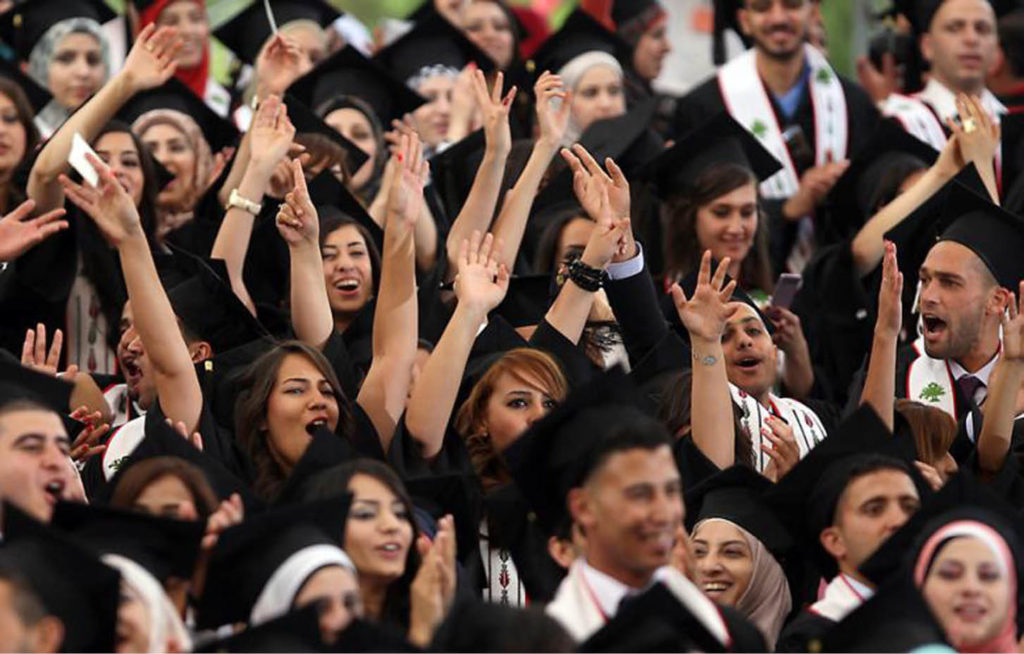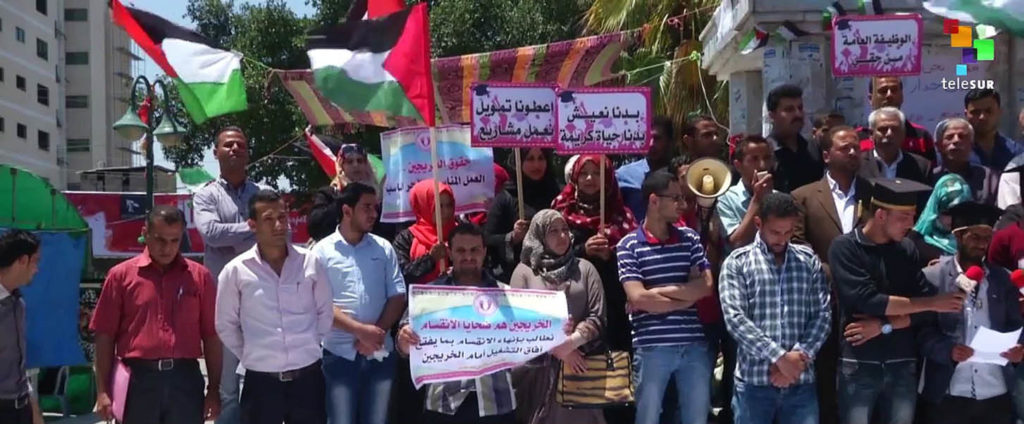Not a day goes by without one of us being asked if Palestine has a real economy, given that Palestinians have been living for five decades under an increasingly well-entrenched Israeli military occupation. The question usually comes from people passing through on a short visit: some are Palestinians who live in the diaspora, others are foreigners who come either singly or in groups; and some visitors arrive under a variety of auspices to study our reality in order to advance peace, but we assume that most come to advance their education and careers. More troubling than to hear this question from outsiders is how often we hear it from our recent graduates. To all, our answer is yes – unequivocally.
If you happen to be one of those who question whether an economy, despite aspects that are truly painful, nonetheless survives under Israeli military occupation, we ask for your indulgence. Palestinians are not superheroes who can sustain their prolonged struggle for freedom and independence without putting bread on the table or paying their children’s tuition, let alone loving, marrying, establishing families, buying homes, purchasing cars, eating out, and so forth.

Palestine’s economy is in the iron-fist grip of the State of Israel. Over 40,000 Palestinians are graduating and entering the labor market every year. Only around 10,000 of them are being absorbed into the market, in both the public and private sectors. Palestine’s economic survival, and maybe political survival as well, depends on finding livelihoods for many more Palestinians, and at an unprecedented rate. This is our collective challenge.
We who are writing this article are blessed to have positive people in our respective surroundings. At home and at work, along with our respective circles of loved ones, colleagues, and friends, we refuse to dwell on the negative. Instead, we analyze our bitter reality, look around at our own children and siblings, and always come to the same conclusion: We simply must find ways to create meaningful livelihoods for us and for them, because otherwise we would be reinforcing the long-standing Israeli fantasy that all Palestinians will, eventually, voluntarily emigrate from Palestine – family by family, new graduate by new graduate. Or, worse yet, we would be fueling extremist elements in our society by giving them ready-made fodder to recruit from – a generation of youth in despair.
Our future and our families are at stake, so we engage with our damaged economy as a means of survival, while entertaining no illusions that we can properly develop it under Israeli occupation.
Just to make sure that we are clear about how bitter our reality is, we share with you an excerpt from the introduction of the latest report submitted by the UN Secretary-General to the UN General Assembly titled, “Economic costs of the Israeli occupation for the Palestinian people: fiscal aspects” (August 2, 2019).*1 It speaks volumes.
Palestine’s version of a “Start-up Nation” is a story of economic survival that will prove to be the foundation of a free and independent state.
Since 1967, the West Bank, including East Jerusalem, and the Gaza Strip have been under Israeli military occupation and the Palestinian people have endured adverse policies that have affected their economy and all aspects of life. The signing of the Protocol on Economic Relations between the Government of the State of Israel and the Palestine Liberation Organization in Paris in 1994, was expected to improve the Palestinian economic situation. However, Palestinian economic development remains elusive and characterized by poor growth performance, chronic fiscal and trade deficits and high dependency on the economy of the occupying Power. Following decades of denying the Palestinian people the right to freely access their natural resources or to make optimal use of their financial resources, the issue of economic losses incurred due to the occupation has been drawing increased attention.

The report concludes with this shocking finding:
[…] the estimated fiscal costs of the occupation resulting only from the sources surveyed in the present report amounts to $47.7 billion during the period 2000–2017. That equals more than three times of what the Palestinians produced in 2017.
That’s the bad news.
And the good news?
Nearly five million Palestinians wake up every morning under military occupation with a stubborn determination to survive. According to the Palestinian Central Bureau of Statistics, 729,971 are infants (0–4 years of age), about 142,000 are in kindergarten, over 1.2 million are primary and secondary school students being served by 55,000 teachers, over 207,000 are enrolled in universities and colleges, over 128,000 Palestinian workers work in Israel and Israeli settlements, and approximately 229,133 are 60 years old and over. About 3 million residents are of working age (15 years and above), and over 1.5 million people are either working or seeking work.
With skyrocketing unemployment rates that now exceed 30 percent in the West Bank and nearly double that in Gaza for youth, to wish or hope that Palestinians remain steadfast without livelihoods is the equivalent of praying that your car will run without gasoline or electricity.
Enter the real Palestine
Palestine’s economy did not drop fully formed from the sky with the signing of the Oslo Peace Accords in 1993 and the establishment of the Palestinian Authority. Historically, in addition to consumer trading, the economy has revolved around agriculture, tourism, and laborers who work in Israel. Since 1994, a new service sector has been added, mainly communications and financial services, as well as a mini army of professionals within civil society and civil servants who serve the government bureaucracy.
Sustained Israeli actions have nearly paralyzed two of our most promising sectors, agriculture and tourism. The World Bank has stated that our agriculture sector has experienced structural damage. This is not surprising, given that agriculture is about land and water, two front lines in this conflict. In addition, the World Bank notes that, in general, the “…continued existence of a system of [Israeli] closures and restrictions is creating lasting damage to economic competitiveness [sic] in the Palestinian Territories.”*2
Tourism is a sensitive sector by nature, and the illegal separation Wall as well as the volatile security situation have suffocated our tourism sector, but not to the point where it has disappeared. Instead of buckling under to Israeli-invoked actions aimed at our de-development, our tourism sector has turned to the domestic tourism market and to alternative tourism products, including political, rural, and experiential tourism, to keep going.
Our laborers who work in Israel are the untold saga of the five-decade-old economic reality. These are the nameless and faceless who put their health, their family relations, and even their lives at risk to cross Israeli checkpoints in the early morning hours, day after day, returning home long after nightfall and after a back-breaking workday to find their children sound asleep. These Palestinian workers, if given the opportunity for decent livelihoods in their own communities, would be the first to benefit from fuller employment opportunities in Palestine.
Looking forward
Together with colleagues, as a group of Palestinian private-sector stakeholders, we are seeking new, creative, and sustainable ways to more significantly challenge our reality. We are exploring how to put our capital, know-how, and efforts into business opportunities that would employ a critical mass of Palestinians. Yes – we are aiming for a critical mass of jobs under military occupation. That is our challenge because this is our reality.
We fully respect and would never belittle, under any circumstances, the many small-scale projects that hire a few persons here and there. In fact, we work in that domain every day and will continue to do so. However, we see that the scale of these projects that involve a low number of employment opportunities will only keep us behind the curve, despite the fanfare they typically receive.
We have set for ourselves a goal: to come up with three to five new business opportunities – structured either for-profit or as social enterprises – to research, each of which will have the potential to hire 100 or more persons located in one or more areas in Palestine. Our hope is that those who read this article will come forward with new ideas, market connections, actual business opportunities, and the like. We stand ready to invest where needed, train where needed, and manage where qualified to do so.
So, addressing all of you who yearn to assist Palestinians in their nonviolent struggle for freedom and independence: We are placing this challenge in front of you, too. Help us conceptualize real business opportunities that will serve real markets, that will employ real Palestinians, and that will place real bread on the table. Send your ideas via www.aim.ps/contact_us.html.
Note: A version of this article was first published in 2017 at HuffPost and in Arabic in Al-Ayyam and Al-Quds newspapers.
*1 For a link to the report, “$48 billion is the estimated revenue loss by Palestine from 2000-2017 due to occupation,” United Nations Conference on Trade and Development, December 2, 2019, please visit https://unctad.org/en/pages/newsdetails.aspx?OriginalVersionID=2254.
*2 “Fiscal Challenges and Long Term Economic Costs: Economic Monitoring Report to the Ad Hoc Liaison Committee, March 19, 2013,” #45, available at http://documents.worldbank.org/curated/en/313821468321846300/text/760240WP0GZ0AH0Box374357B00PUBLIC0l.txt.


